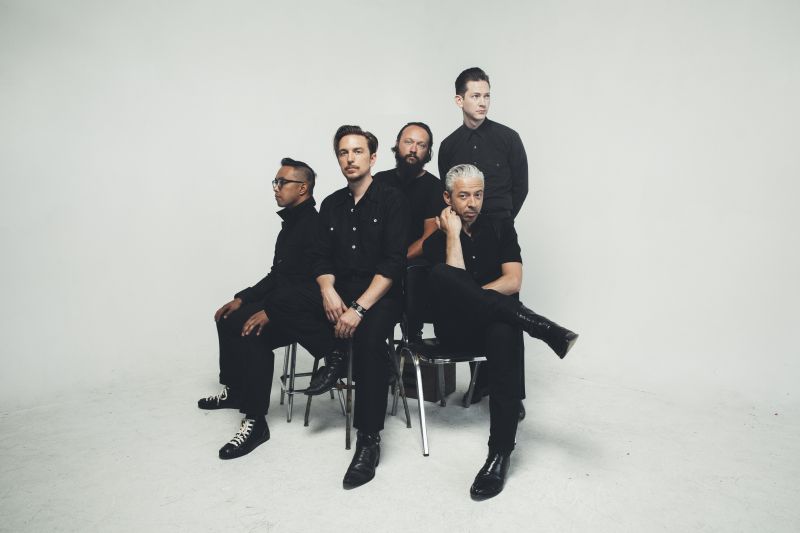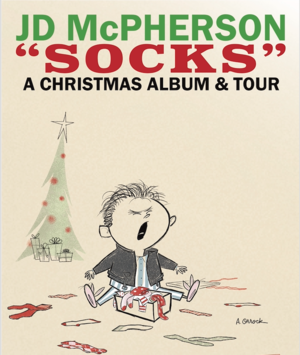JD McPherson (and his band) - Minneapolis, MN
Sales for this event are closed.
- Erika G
- Tracy H
November 29 - First Avenue, 8pm - Minneapolis, MN
“I was having nightmares every night, thinking, ‘Wow, they’re going to hate this,” says JD McPherson.
When he talks about his new album, Undivided Heart & Soul, there’s no glimmer of self-adulation, or even the confidence one might expect of a veteran artist. Instead, there’s a snapshot of McPherson’s creative process bringing the record to life, a journey filled with fear and change, then boldness, and, eventually, catharsis.
The best rock music has a story to tell. This record chronicles a series of upheavals, frustrations, roadblocks, and kismet—a cross-country move, failed creative relationships, a once-in-a-lifetime career opportunity, and learning to love making music again by letting go.
McPherson calls moving his family from Broken Arrow, Oklahoma, to East Nashville a decision based “on opportunity” and one he was reluctant to make but notes the profound influence the city has had on his new crop of songs.
“Up to this point, I thought I knew what I was doing with songwriting, that I don’t do this or that,” McPherson says. “Writing with people who co-write for a living…maybe I saw myself as John Henry, and them as the steel-driving machine.”
Along with collaborations with fellow Oklahoman Parker Millsap, Butch Walker, and Aaron Lee Tasjan, McPherson’s selections for Undivided Heart & Soul include many deeply personal themes: “Let’s Get Out of Here While We’re Young” shares writing credits with longtime bandmate Ray Jacildo and McPherson’s wife Mandy. He also delved into character profiles, both fictional and based on real-life experiences, stories McPherson has held onto but never thought of as fodder for songwriting, such as the Las Vegas bus station interlude detailed in “Style (Is a Losing Game).”
“That seems like a pretty normal thing for a singer-songwriter to do, to write about personal experience, but I really have never done that,” McPherson says. “It felt great but it also was tough at the same time. The thing is, John Henry is trying to beat the machine because he’s in awe of it. It was a lot of me saying, ‘You’re really good at this, and I have a hard time doing it.’”
With a group of soul-baring tracks taking shape, McPherson and crew scheduled studio time to help force the issue. It quickly became apparent that these sessions were not going to work, bringing McPherson’s momentum to a halt.
To clear his head, he flew to Los Angeles at the invitation of friend and longtime supporter Josh Homme of Queens of the Stone Age, who was also recording at the time. McPherson, Homme, and his Queens bandmate Dean Fertita played around with some songs, with Homme pushing McPherson outside of his comfort zone in a no-stakes environment.
“His thing was, ‘I’m going to throw all kinds of crap onto your songs that you’re not going to want to hear, and you’re going to play ridiculous stuff you wouldn’t normally do,’ and Dean was kind of the calming presence,” McPherson says.
McPherson calls the getaway “the most fun I’ve had since I was 15 years old” and returned to Nashville with a clear head, internal filters successfully stifled, ready to move forward.
That fresh perspective in tow, McPherson learned that the long-shot “backup” studio, the legendary RCA Studio B in Nashville, was willing to host his band for the making of the record. RCA Studio B was fundamental to the creation of the “Nashville Sound,” and the ghosts of some of the greatest songs in history live within its walls: Dolly Parton’s “I Will Always Love You,” and Elvis Presley’s “Are You Lonesome Tonight?” among them.
Artists who choose to record at Studio B are met with a rigorous list of requirements, including using a recording method appropriate during the studio’s heyday. Since the studio is a working museum by day, the entirety of McPherson’s workspace had to be reset at night: Load in all equipment in the late afternoon, work until 3:00 or 4:00 a.m., and leave no trace nightly. Repeat. Repeat. Repeat.
“Those rules would probably turn a lot of bands off, but they turned us on, 100 percent,” McPherson says. “I really love walking into a classic studio as much as I love getting my hands on a really old guitar. I like knowing that something was used for a long time and has good things in it.”
But this isn’t an old Nashville record, by any measurement, nor is it the record McPherson set out to make, with credit due to co-producer Dan Molad (also the drummer for Lucius).
“There’s a pretty broad gap in our tastes, what we do and what we’re into,” McPherson says. Where he’s as likely to lean on The Cramps as he is Irma Thomas for inspiration, Molad’s left-field production suggestions included a Casio synthesizer and running a Fender Rhodes through a tape delay. (McPherson nixed the former; the latter became the signature sound of one of the record’s tracks.) “We ended up learning a lot from each other, and he did a lot of stuff I’d have never thought to do.”
During the song “Let’s Get Out of Here While We’re Young,” JD sputters the line “We’ve worn out all the songs we’ve sung.” This is not a statement McPherson takes lightly.
“This record was difficult for me to make, difficult to write, difficult to record. It took a lot for me to say that I can’t force these songs to be the way people are expecting,” McPherson says.
Undivided Heart & Soul is a statement record, one that asserts McPherson as he is now, battle-weary but stronger than ever.

- Erika G
- Tracy H
